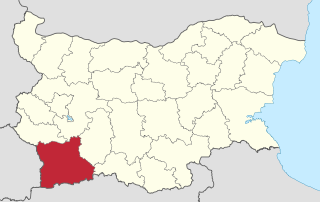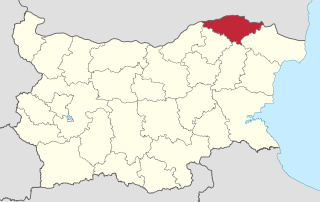
Blagoevgrad Province, also known as Pirin Macedonia or Bulgarian Macedonia, is a province (oblast) of southwestern Bulgaria. It borders four other Bulgarian provinces to the north and east, the Greek region of Macedonia to the south, and North Macedonia to the west. The province has 14 municipalities with 12 towns. Its principal city is Blagoevgrad, while other significant towns include Bansko, Gotse Delchev, Melnik, Petrich, Razlog, Sandanski, and Simitli.

Kardzhali District is a province of southern Bulgaria, neighbouring Greece with the Greek regional units of Xanthi, Rhodope, and Evros to the south and east. It is 3209.1 km2 in area. Its main city is Kardzhali.

Haskovo Province is a province in southern Bulgaria, neighbouring Greece and Turkey to the southeast, comprising parts of the Thracian valley along the river Maritsa. It is named after its administrative and industrial centre - the city of Haskovo. The province embraces a territory of 5,533.3 km2 (2,136.4 sq mi) that is divided into 11 municipalities with a total population, as of December 2009, of 256,408 inhabitants.

Pazardzhik Province is a province in Southern Bulgaria, named after its administrative and industrial centre - the city of Pazardzhik. The territory is 4,456.9 km2 (1,720.8 sq mi) that is divided into 12 municipalities with a total population of 275,548 inhabitants, as of February 2011.

Lovech Province is one of the 28 provinces of Bulgaria, lying at the northern centre of the country. It is named after its main city - Lovech. As of December 2009, the population of the area is 151,153.

Razgrad Province is a province in Northeastern Bulgaria, geographically part of the Ludogorie region. It is named after its administrative and industrial centre - the town of Razgrad. As of December 2009, the Province has a total population of 132,740 inhabitants on a territory of 2,639.7 km2 (1,019.2 sq mi) that is divided into 7 municipalities.

Montana Province is a province in northwestern Bulgaria, bordering Serbia in the southwest and Romania in the north. It spreads its area between the Danube river and the Balkan Mountains. As of February 2011, the province has a population of 148,098 inhabitants, on territory of 3,635.5 km2 (1,403.7 sq mi). It was named after its administrative centre the city of Montana.

Dobrich Province is a province in northeastern Bulgaria, part of Southern Dobruja geographical region. It is bounded on east by the Black Sea, on south by Varna Province, on west by Šumen and Silistra provinces, on the north by Romania. It is divided into 8 municipalities. At the 2011 census, it had a population of 186,016. The province was part of Romania between 1919 and 1940.

Shumen Province is a province in northeastern Bulgaria named after its main city Shumen. It is divided into 10 municipalities with a total population, as of December 2009, of 194,090 inhabitants.

Silistra Province is a province of Bulgaria, named after its main city - Silistra. It is divided into seven municipalities with a total population, as of December 2009, of 127,659. The province is part of Southern Dobrudja, which was part of Romania until 1940.

The Bulgarian Muslims or Muslim Bulgarians are Bulgarians of the Islamic faith. They are generally thought to be the descendants of the local Slavs who converted to Islam during Ottoman rule. Most scholars have agreed that the Bulgarian Muslims are a "religious group of Bulgarian Slavs who speak Bulgarian as their mother tongue and do not understand Turkish, but whose religion and customs are Islamic". Bulgarian Muslims live mostly in the Rhodopes – Smolyan Province, the southern part of the Pazardzhik and Kardzhali Provinces and the eastern part of the Blagoevgrad Province in Southern Bulgaria. They also live in a group of villages in the Lovech Province in Northern Bulgaria. The name Pomak is pejorative in Bulgarian and is resented by most members of the community, The name adopted and used instead of Pomak is Bulgarian Muslims.

Islam in Bulgaria is a minority religion and the largest religion in the country after Christianity. According to the 2011 Census, the total number of Muslims in Bulgaria stood at 577,139, corresponding to 7.8% of the population. According to a 2017 estimate, Muslims make up 15% of the population. Ethnically, Muslims in Bulgaria are Turks, Bulgarians and Roma, living mainly in parts of northeastern Bulgaria and in the Rhodope Mountains.

Bulgarian Turks, also referred to as Turkish Bulgarians, are a Turkish ethnic group from Bulgaria. In 2011, there were 588,318 Bulgarians of Turkish descent, roughly 8.8% of the population, making them the country's largest ethnic minority. They primarily live in the southern province of Kardzhali and the northeastern provinces of Shumen, Silistra, Razgrad and Targovishte. There is also a diaspora outside Bulgaria in countries such as Turkey, Austria, Netherlands, Sweden, and Romania the most significant of which are the Bulgarian Turks in Turkey.

Muhacir or Muhajir are the estimated 10 million Ottoman Muslim citizens, and their descendants born after the onset of the dissolution of the Ottoman Empire, who emigrated to Thrace and Anatolia from the late 18th century until the end of the 20th century, to escape ongoing ethnic cleansing and persecution in their homelands. Today, between a third and a quarter of Turkey's population of almost 80 million have ancestry from these Muhacirs.

Romani peoplein Bulgaria constitute Europe's densest Romani minority. The Romani people in Bulgaria "speak Bulgarian, Turkish or Romani, depending on the region and their religious affiliations."

Religion in Bulgaria has been dominated by Christianity since its adoption as the state religion in 865. The dominant form of the religion is Eastern Orthodox Christianity within the fold of the Bulgarian Orthodox Church. During the Ottoman rule of the Balkans, Sunni Islam spread in the territories of Bulgaria, and it remains a significant minority today. The Catholic Church has roots in the country since the Middle Ages, and Protestantism arrived in the 19th century.
Slavic speakers are a linguistic minority population in the northern Greek region of Macedonia, who are mostly concentrated in certain parts of the peripheries of West and Central Macedonia, adjacent to the territory of the state of North Macedonia. The language called "Slavic" in the context of Greece is generally called "Macedonian" or "Macedonian Slavic" otherwise. Some members have formed their own emigrant communities in neighbouring countries, as well as further abroad.

Glavinitsa is a town in northeastern Bulgaria, part of Silistra Province. It is the administrative centre of Glavinitsa Municipality, which lies in the southwestern part of Silistra Province, in the historical region of Southern Dobruja. As of December 2009, the town has a population of 1,928 inhabitants.

Parcani is a large commune and village in the Slobozia District of Transnistria, a de facto independent entity within the internationally recognized borders of Moldova. The village has a population of around 10,500, of whom 95% are ethnic Bulgarians. The first Bulgarian colonists arrived in the village in the early 19th century. According to some sources, it is the largest Bulgarian-majority village outside the borders of Bulgaria. A monument to Bulgarian national hero Vasil Levski was unveiled in Parcani in September 2008.
Paskalevo is a village in the municipality of Dobrichka, in Dobrich Province, in northeastern Bulgaria.



















